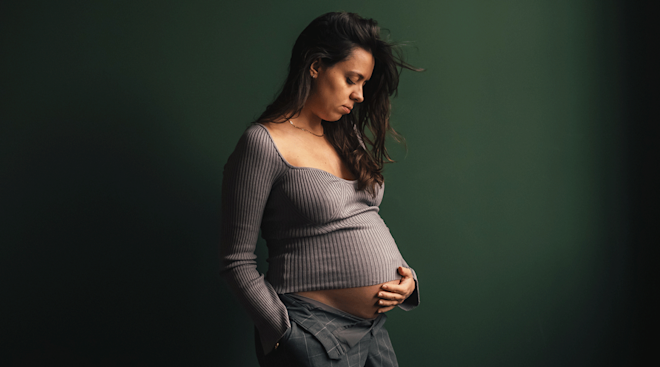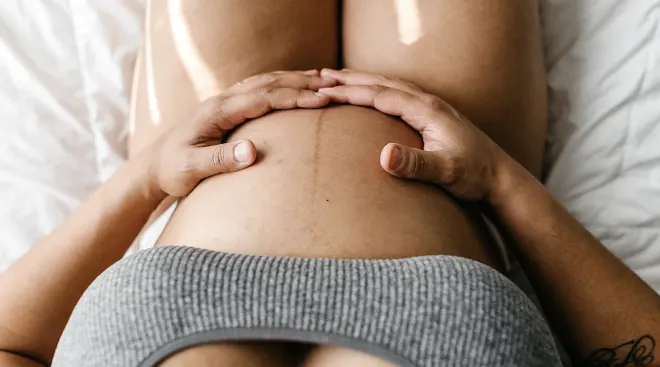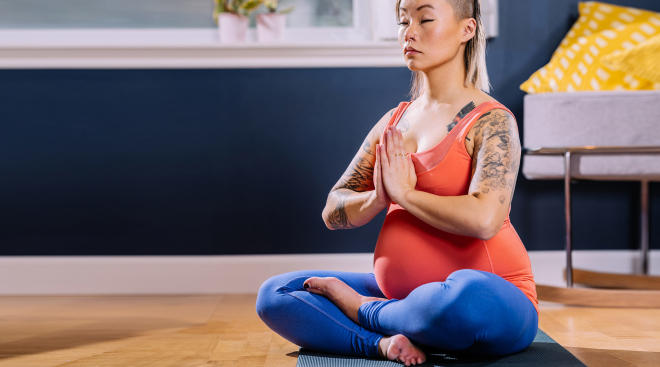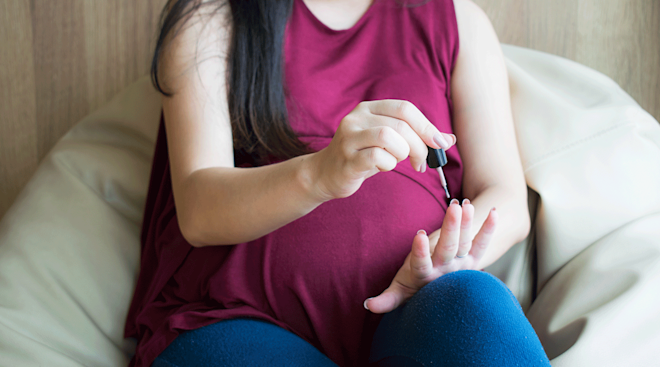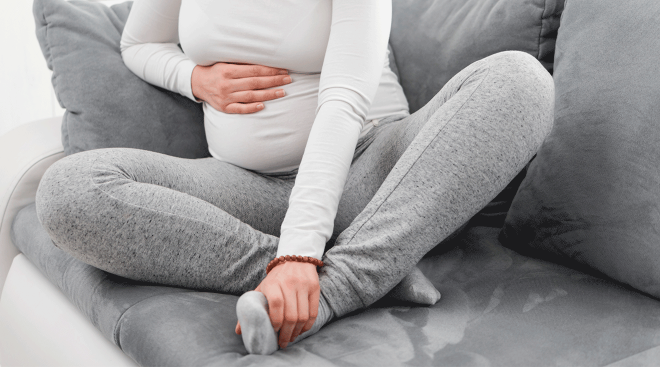Social Stigmas Black Pregnant Women Face—and How to Counter Them
Eight months pregnant with my second child, I waddled into a nearby nail salon, desperate for a little pampering. “Mission accomplished,” I thought, as I sat and let my nails dry after a deluxe mani-pedi. I was feeling satisfied with myself when the woman sitting next to me sparked up a conversation. “Is this your first child?,” she asked. “No, my second,” I happily replied. Without a moment’s hesitation, she followed up: “Same fathers?” I shot her a terse “yes,” and turned away. I was shocked. What did that matter? Why did she care? And how was it any of her business?
To some, this may seem innocuous—just a nosy woman asking an odd question. But it’s actually representative of so much more. As Black pregnant women, we face a long list of biases from the people we encounter everywhere we go—the grocery store, the doctor’s office and, yes, even the nail salon. Assumptions like:
You’re a single or unwed mother.
You’re poor or low income.
You’re on welfare.
Your pregnancy was unplanned.
You have multiple baby-daddies.
You must be hyper-fertile.
It’s disheartening to say the least. But it’s important to acknowledge that these stigmas do exist, and to find healthy ways to counter them and cope with them along your pregnancy journey.
A 2020 survey found that Black women experience “gendered racism during pregnancy” that manifests as stereotypes stigmatizing Black motherhood and devaluing Black pregnancies. In other words, a Black woman’s prenatal care, birth experience and parenting journey are often perceived as less meaningful than those of her white counterparts. Moreover, this “racialized pregnancy stigma”—which, by the way, pervades all areas of life—exists regardless of a woman’s socioeconomic or marital status.
The research is compelling, but the real-life anecdotes are even more powerful. One Black pregnant woman I spoke to remarked that, during her subway commute to work, people were more likely to crane their necks to see if she was wearing a wedding band than they were to offer her their seat. She felt like an object of curiosity, rather than a living, breathing person growing another human life inside of her.
Shanicia Boswell, author of Oh Sis, You’re Pregnant! The Ultimate Guide to Black Pregnancy & Motherhood, says that when she and her partner—both working professionals in their 20s—decided to have a child together, they were treated like ignorant children. “It was the way they spoke to us,” recalls Boswell. “We went to every appointment together, lived together and were financially stable, but we were treated like we didn’t have anything together.”
The truth is that, while most pregnant people can focus on the well-being of themselves and their babies, Black women must also think about superficial factors that may affect how they’re treated. (Am I dressed nicely enough? If I’m late, will the doctor think I don’t take this seriously? If I ask too many questions, will they think I’m difficult?) These may seem like minor considerations, but the implications of bias in healthcare have a much more harmful effect than simply causing anger, hurt or embarrassment. It leads to prejudice in care, treatment, pain management and more. And the concern is even more dire for Black pregnant women.
The Black maternal health crisis is real, and the disparities in care and outcomes are staggering. According to the Centers for Disease Control and Prevention (CDC), Black women are three times more likely to die from a pregnancy-related cause than white women. The reasons are complex and multifaceted, but implicit bias undoubtedly plays a big part.
What’s more, research has found that the stress of dealing with both racial and gender discrimination can cause wear and tear on inflammatory and metabolic functions and the hormonal system. “Arline Geronimus coined the ‘weathering’ hypothesis—that Black women experience advanced aging and thus are more prone to chronic medical diseases due, in part, to chronic stress related to socioeconomic disadvantages and pervasive racism,” explains Temeka Zore, MD, an ob-gyn and a medical advisor for Modern Fertility. “As a Black woman, having the constant thought or need to be ‘on alert’ due to the color of your skin is stressful, and sometimes you don’t even realize how aware you are of this until you start to talk about it.”
Carrying the stress of staring down stigma and prejudice in pregnancy is a frightening thought. And while you may not be able to keep someone from making ignorant assumptions about you, your family and your life choice, you can take steps to lessen the impact racialized pregnancy stigma has on you and your experience. Here are six expert tips to help you cope.
Set the tone
Ask to meet your care team and introduce yourself, advises Shawana Moore, DNP, an assistant professor at the Jefferson College of Nursing. This helps them see you as a real person, with emotion and opinions rather than a name on a chart.
Use your voice
Speak up and advocate for yourself. “If you feel you’re being stereotyped or judged, then don’t hesitate to go to that healthcare provider’s superior to address the situation at a higher level,” said Zore. “And if you feel your provider is giving you substandard care, seek out a second opinion. It’s so important that patients have trust in their physicians.”
Don’t go solo
Consider bringing along a partner, friend or family member with you as support. Moore recommends openly sharing information with loved ones throughout your care. With your permission, your doctor or midwife should be willing and able to give them information.
Ask for help
Too often, Black women feel they have to handle it all on their own. “It’s the trope of the ‘strong Black woman,’” says Boswell. “It’s unfair to us. We have to start asking for help… Continuing the narrative that we’re so strong that we don’t need anyone is actually detrimental to our entire society.”
Have the ‘right’ support system
It’s great to find a community of people who are like-minded, but it’s also valuable to have diverse perspectives from people who can help you see things in different ways, says Christina Brown, creator of the blog LoveBrownSugar.com. Make sure that you have loved ones around you who are looking out for your best interests. The message is: Find your people—the ones “you feel good about doing life with,” she says. Facing social stigmas isn’t fair, but having people who understand you, support you and have your back will help.
Embrace online communities
A real-life support system is wonderful, but a virtual one has other benefits. There are great online resources for moms of color (or any parent, for that matter). Reading about similar experiences and getting empathy and validation from people all over the world can make you feel more empowered in your journey. Another benefit of turning to the web? Complete anonymity and zero judgment (at least from actual people in your face at the nail salon). “We need our emotions to be heard,” says Boswell. “It’s a beautiful thing.”
About the experts:
Shawana Moore, DNP, CRNP, WHNP-BC, is an assistant professor at the Jefferson College of Nursing, where she also received her Doctor of Nursing degree.
Temeka Zore, MD, is an ob-gyn and the director of fertility preservation at Spring Fertility in San Francisco. She also serves as a medical advisor for Modern Fertility. She earned her medical degree from Indiana University School of Medicine.
Shanicia Boswell is the author of Oh Sis, You’re Pregnant! The Ultimate Guide to Black Pregnancy & Motherhood and founder of Black Moms Blog.
Christina Brown is the creator of the blog LoveBrownSugar.com.
Plus, more from The Bump:
Navigate forward to interact with the calendar and select a date. Press the question mark key to get the keyboard shortcuts for changing dates.

































